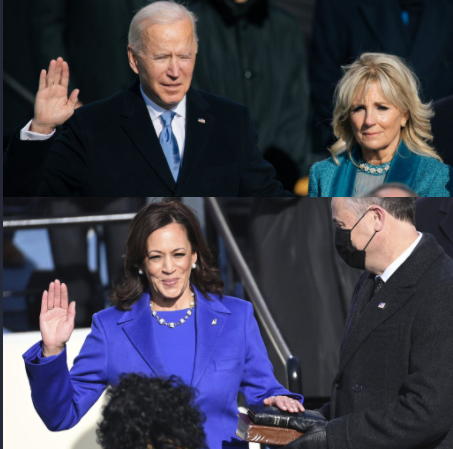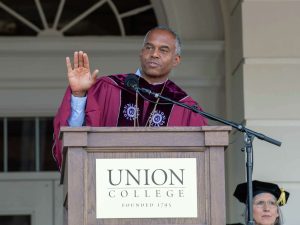An Inauguration Like No Other

Top: Joe Biden sworn in as President of the United States; Bottom: Kamala Harris sworn in as Vice President of the United States
January 28, 2021
On Wednesday, January 20, the 46 President of the United States—Joseph R. Biden Jr—was inaugurated. The pomp and circumstance surrounding the ceremony embodied the future Biden saw—both the negative and the positive. After he was sworn in, Biden gave a speech about the barrage of troubles that the nation is facing: the COVID-19 pandemic, mass unemployment, racial injustice and the rise of white supremacy, climate change and political divisiveness.
While past presidents delivered similar talking points during their inaugurations, this ceremony was distinguished by the severity of these problems in the present. “Few periods in our nation’s history have been more challenging or difficult than the one we’re in now,” he said.
“We will be judged, you and I, for how we resolve the cascading crises of our era. Will we rise to the occasion? Will we master this rare and difficult hour? Will we meet our obligations and pass along a new and better world for our children? I believe we must and I believe we will,” Biden went on to say.
Some of these crises were in plain sight. in order to minimize the spread of the coronavirus which has claimed the lives of over 400,000 Americans so far, everyone in attendance wore a mask and sat six feet apart. Instead of people, the National Mall was filled with almost 200,000 flags. After his followers stormed the Capitol in an attempt to stop the confirmation of the 2020 election, former President Donald J. Trump did not attend the ceremony. There were 15,000 troops on guard—three times as many soldiers than there are in Afghanistan right now—to protect the Capitol and dignitaries from potential domestic terrorist attacks, according to Military Times.
“We have to be different than this. America has to be better than this. And I believe that America is so much better than this,” Biden said in his speech.
The social changes that the country has gone through since its independence were evident as well. Vice President Kamala Harris—the first African-American, Asian-American and woman to hold the position—was sworn in by the first Latina Justice on the Supreme Court, Sonya Sotomayor. Jennifer Lopez called for liberty and justice in Spanish during her medley of “America the Beautiful” and “This Land is Your Land.” Country singer Garth Brooks promoted unity when he asked the nation to sing “Amazing Grace” along with him. National Youth Poetry Laureate Amanda Gorman read about the resiliency of the United States in her poem “The Hill We Climb:”
“Somehow we’ve weathered and witnessed a nation that isn’t broken, but simply unfinished. We [are] the successors of a country and a time, where a skinny Black girl descended from slaves and raised by a single mother can dream of becoming president, only to find herself reciting for one.”’
Biden agreed with the idea of the United States being an “unfinished” nation. He identified some of the problems that the country faces, specifically racism and demonization, as endemic. However, he was hopeful about the future prospects of the country as well, stating, “Through struggle, sacrifice and setbacks, our better angels have always prevailed.”
Although he began issuing executive orders within hours of taking office, Biden identified unity as a foundational condition to addressing these crises. “Without unity, there is no peace, only bitterness and fury. No progress, only exhausting outrage. No nation, only a state of chaos. This is our historic moment of crisis and challenge, and unity is the path forward.”






